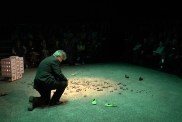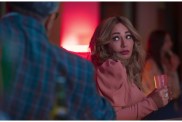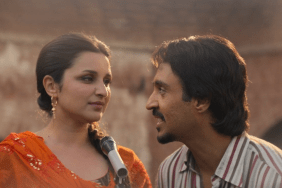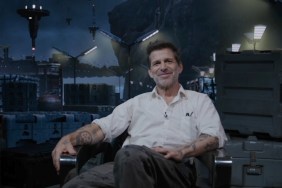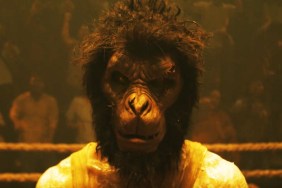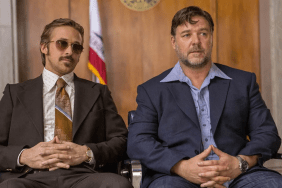With over forty years of directing under his belt and ten years on from his foray into the world of James Bond with 1999’s The World is Not Enough, director Michael Apted has decided to return to doing a big budget franchise by tackling the third installment in C.S. Lewis’ fantasy series, The Chronicles of Narnia: The Voyage of the Dawn Treader. The project involved over three years of development and various starts and stops as Disney decided not to produce a third movie and Walden Media instead paired with 20th Century Fox, but the film is finally ready to be seen with all of the magical worlds an imaginary creatures that have made Lewis’ books so beloved.
The third chapter has Lucy and Edmund Pevensie (Georgie Henley, Skandar Keynes) traveling across the seas of Narnia along with Ben Barnes’ Caspian and their aggravating cousin Eustace Scrubb (Will Poulter from Son of Rambow) looking for seven Lords of Narnia and their seven swords, while taking on an evil green mist that brings out the worst in all of them.
ComingSoon.net sat down with the filmmaker earlier this week when he popped through New York City to talk to him about the decision to tackle his most FX-laden film to date.
ComingSoon.net: I remember when we spoke at the presentation in September and you mentioned that you didn’t read the “Narnia” books when you were a kid but that your kids read them because you were…
Michael Apted: Too old, that’s right.
CS: What was the incentive to get you on the project, because I know Andrew had done the first two movies and was hoping to do the third movie, so was that something where you approached them?
Apted: Well, I had done “Amazing Grace” for Walden. I’d just done it and they had been pleased with it, so I was living in the right place at the right time. That’s a big key to getting some of these jobs is to being there when you’re needed or when they need you. So they approached me about doing it and I was interested. I fancied the idea of doing a large film again, a film which had an audience, so there would be some expectation about it and I wouldn’t have to grind out a lot of press and publicity to try and get people to go see the film, so I liked that. Also I liked the idea of the film, I liked the notion of doing something which had somewhat of a spiritual message to it as long as one could balance it off and not make it just something exclusively Christian. The other thing that attracted me to it in the material was I’ve always liked to have done an epic film, but not just an epic, an epic film that had an intimate and emotional story at the heart of it to see whether you could do something that had that counterpoint.
CS: Was that all in the script or was that something you remembered from the books?
Apted: No, when I came on, there wasn’t really a script at all; it was just the book. They’d started on a script, but they hadn’t gotten very far with it and it was a sort of an outline, but it wasn’t any good. So when I came on, it was pretty much starting from ground zero.
CS: Had “Prince Caspian” come out at that point?
Apted: No, it hadn’t. I mean, that was the point. That was one of the reasons I was asked to do it and why Andrew couldn’t do it, because he had only just started shooting “Prince Caspian,” and they were all a bit chuffed with themselves.
CS: So you were actually on board a while before they even started shooting “Caspian”?
Apted: Well, they had just started shooting it, when I went to audition for it, when I went to meet Andrew and the kids, they had just started shooting in Prague. I mean that’s why the whole thing got into a bit of a muddle because they engaged me and we started work and then “Caspian” sort of hit trouble. Things were going very slowly, they were in terrible weather, and spending a lot of money on location and all that, and so they kind of already postponed me as soon as I got on. Then when the picture opened, it didn’t do what the last one had done, so then they started reevaluation the franchise, “What are we gonna do? We can’t go on like this,” and all these sort of dramas. So then they cut me back, cut my budget pretty much in half and suggested that I kind of re-imagine the film doing more in studio, which I did, or at least most of it. Then, the only place in the world that we could really shoot, which had water and good studio space was in Mexico, that magnificent studio Rosarito where they filmed “Titanic.” Then the Mexican drug wars came knocking on the door, and that was chaos there. It was just horrible there.

CS: So you did end up shooting in Mexico, though?
Apted: No, we didn’t shoot there, we just moved into the stages and sort of started planning it and designing the boat and all this. Suddenly we realized it was like being in Baghdad, or even worse. I remember murders and the military around. We would’ve had to be in armored cars and people said, “You can’t do this. This is ridiculous.”
CS: I remember Mark Johnson mentioned Mexico and then you moved to Australia. I wasn’t really sure if it was for budgetary reasons.
Apted: No, it wasn’t. Then, just after that point for reasons like that and other ones Disney pulled out. Then, simultaneously to that, which was our one big stroke of luck was that by some miracle–I mean, everybody’s economies and currencies were crumbling around Christmas 2008–but the only one that didn’t was the American dollar. Suddenly, I mean, I’d been all over the world looking for locations, and the first inspirations of the film, so we looked at Australia which had studio space and did have a sea that I could use. Their currency had dropped from 93 cents to 62 to the dollar. In London, which has magnificent post production facilities, the pound had gone $2.20 to $1.49. So suddenly it became financially viable to do it, so that’s the luck we had to make the film.
CS: You also had a good amount of time to think about the project and develop it.
Apted: (Laughs) Too much.
CS: Besides Mark and the young actors and Walden, were you able to get any of the crew who worked on the two previous movies?
Apted: Yes, I brought on my own production designer, editor, cinematographer. I lost the production designer in all the delays and all that sort of stuff, but my DP, Dante Spinotti, my editor, Rick Shane, stayed with me and then we found another production designer. During that period, there’s a lot of other stuff going on for me at the time, there’s the writer’s strike and I was President of the Directors Guild, so I was in the middle of all that. So all that was going on, and the industry was in some turmoil with the writer’s strike and the threat of the actor’s strike. But nonetheless, we were actually doing quite a lot of work. For example, the end battle scene with the sea serpent, which changed a lot in the script over the years, but we started to do a kind of previz version of that. We did quite a lot of work, so we were doing good work. We weren’t getting anywhere near making the film, but we were doing stuff that we could use later on, so when we did get eventually the green light, we were able to move pretty quickly.
CS: You mentioned locations and moving onto the sound stages instead. There are still some locations in the movie though.
Apted: There’s a lot, yeah. I mean, there’s only one purely built set, which looks exterior which is the Magician’s Garden, but everything else was shot on location, but there was a lot of extra work done to it. For example, the last scene, the scene in Aslan’s Country was a bloody great beach south of Brisbane, which was a bird sanctuary. But what was good about the water there, it was quite calm because there’s the Great Barrier Reef out there, so there’s many layers of rock to kind of calm the sea down between mid-ocean and hitting the coastline. So we shot a lot, about 60 percent of it on location, but then we transformed the locations with visual effects, whereas Andrew, I think on the first two did a lot of shooting on location, but that meant a lot of travel and a lot more expense. I mean, when I think back on it, it wasn’t a bad discipline I was put under because I think, “How the hell could I have found some of these locations? Some amazing lagoon, where things turned to gold?” I mean, I did find one in New Zealand and I was gonna use that and I think I must’ve been crazy because it was a long scene, and to be out there in New Zealand weather trying to do everything, so we did build that. We built that as a grotto. So we made changes, but we still tried to keep the feeling of shooting it outside at night. As I said, that last big scene, which to me was the real whammy of the film, if that scene didn’t work, then I was sunk, and I decided to shoot that outside. I couldn’t have shot that on a stage. I nearly had a heart attack because the first morning we were out there we kinda got blown off the beach, but we were shined upon and we got through it all, although it was totally surreal. There was this vast beach and these four actors and someone running around with Aslan’s head, and someone else running around with a little Reepicheep, and us kept moving around so the sun was always in the right position and trying to do this very emotional scene. It was very odd, but the kids pulled it off.
CS: I’ve talked to Andrew a bunch of times over the years, and he told me that he stood in for many of the creatures while doing scenes with the kids. Did you do that at all?
Apted: That’s right, yeah. Well, I did something smart, actually. Not that he’s not very, very smart, but I hired someone to play Reepicheep. So he was on the whole time and the kids sorta built a relationship with him. So, every time Reepicheep was in the scene, he was there doing the voice and he would rehearse with them and stuff like that. Since it was more crucial actually in this film to create a relationship, especially between Eustace and Reepicheep I think. So I didn’t do voices off (camera) for that, I hired an actor to do it and just to give some presence to Reepicheep so he was not just a hole in the ground, that he actually had some identity even though it was absurd, you know, a fully grown man like you and I playing a mouse, but at least it gave some connection, if you will.

CS: Obviously this has more visual effects than anything you’ve ever done.
Apted: Oh, by miles, yes.
CS: You also had the 3D aspect, and it’s kind of amazing you got it done as quickly as you did.
Apted: Oh, I know. It’s a miracle. I mean, I thought I was going to have a lovely year in London, a year’s post-production. I thought, “How can you spend a year doing post-production, the cost?” It turned out to be as stressful a year as I’ve ever had, largely because there’s always deadlines. “We gotta see the cut by February because if you don’t do that we can’t do that, we can’t do that and then we don’t make the thing.” The problem as it is, the 3D was quite a big deal, but you can’t actually finish the 3D until all the digital effects are done, so if the visual effects are late, then the 3D will be late, so it just seems to be going from deadline, and you would say, “F*cking hell, but we don’t open for 10 months and they’re already beating me up.”
CS: Were you editing on set while filming so you already had stuff edited when you got to post?
Apted: Yeah, I like to do that. We only worked five days a week because of the children, so on the sixth I always edit. I like doing that anyway to see whether I’m missing stuff and things like that. I actually had a cut of the film by Christmas, and then I showed it to the studio, started showing the producer and the studio around February time and then all that started. But again, a lot of that was against the kind of the deadlines of when all the visual effect shots, all 1,300 of them had to be kinda delivered. But it was an achievement in management that we actually delivered the film.
CS: Other than the “Up” Series, have you actually worked with kids to this extent?
Apted: Not really, no. I suppose I’ve had kids in stuff, but nothing I could point to, really.
CS: Most of them had only done one or two movies before. Did you feel that they had what you generally needed from actors when they came in?
Apted: Well, I certainly did. I always learn doing documentaries, and especially the “Up” films, you can’t talk down to kids. If you do that, then you’re sorta sunk. You have to teach and treat them as equals like anybody else, but I liked this particular group. I thought he cast them very, very well. What I really liked about them was they seem connected to the world. They weren’t stage kids. They had already done two big movies. They weren’t like that. They had their home life, they had their school, they have their interests. They weren’t kind of all dewy-eyed about it. So, they were more interested in the process of it than the trappings of it. It was a big jump for both Lucy and for Skandar. They had much more to do in this film than in the other one. I was relieved by how engaged they were because we started out the whole process with doing two or three weeks’ rehearsal with them, which is a lot of fun for them. They had to do swimming rehearsal, scuba, fencing, all that sorta stuff, but it meant that we had time to bond and go through the stuff and look at the scenes and have the writer around and things like that. They seemed to respond well to that.
CS: I met Georgie and Skandar five years ago and it’s amazing that they’re full-grown teenagers now.
Apted: Yeah, unbelievable, isn’t it? I mean, I was very lucky casting Eustace because we could talk about him in a bit, but after I finished shooting he just shot up. He’s grown six, seven inches since we finished shooting.
CS: Oh yeah, that was happening while in “Prince Caspian,” the wardrobe department was going nuts trying to keep up with Skandar while making “Prince Caspian.”
Apted: I know it. I got so nervous about Eustace because he was already 16, 17 about. I recorded his whole performance in case his voice broke. But anyway, we were lucky there.
CS: Obviously no one wants to jump the gun or anything, but if they said, “Okay, this movie did really well. We want you to do the next one.” Is that something which you could even fathom doing, another one?
Apted: Oh yeah, no, I think so. I mean, I remember they asked me to do the next “Bond,” and I said I would do it, then there was a change of studio and the studio said, “No, no, we can do better than that,” and all that sorta stuff. I thought that was kinda charming. “We’ll get Ridley to do it or John Woo to do it, or something like that.” Then of course, they couldn’t, but by that time I’d got another job, but no, I would certainly want to think about it for sure.

CS: Have you started thinking at all about “56 Up”?
Apted: Yes, I have.
CS: It’s gonna be fairly soon you’re gonna have to start?
Apted: Yeah, I’m gonna shoot it about, at the moment it’s September of next year, and I’ve got broadcast dates already, for God’s sake – the 13th, 14th and 15th of May 2012. So I’ve got a job there, so yes, I am thinking about it.
CS: That’s the great thing about the series is that you know that every seven years you have a job.
Apted: I know, I know, yeah. I don’t know whether that can sustain me over seven years financially, but nonetheless, no, it is. But I am thinking about them. We started speaking to them, all the games have started and all this sort of stuff.
CS: Is everyone still alive?
Apted: Yes, they are still alive.
CS: So that’s great, yeah.
Apted: I had a screening of this for them. I like to do that, the Sunday before last. Not all of them, but a lot showed up with their kids and grandkids and I was looking at them and I was thinking, “You know, now we really are getting into mortality and retirement and aging and all that sorta stuff.” They’re looking what they are, mid-50’s.
CS: I mean, it’s great that you were able to find kids who were able to live to their 50s.
Apted: I know, it’s almost unbelievable, isn’t it? That, of course, and I just thought, “Well, this has now become a reality.”
CS: So do you think that’s what you’re gonna do next? Do you have anything else?
Apted: No, I want to do something else. I don’t have anything, but obviously ideally–it’ll never happen–but I’d like to find something small to do, something that’s quick and small and whatever. I mean, that would be a nice rhythm to have. The thought of taking on another huge film straightaway would be a bit alarming, but, I’m not one of these people who can sit down and say, “Oh, I’ll just write myself a nice low-budget quick script,” and all that sort of thing.
CS: Finding the script, that’s the hard part. You gotta find a script that’s ready to shoot.
Apted: Yeah, exactly. So I’m sure my dream will not come true, but I’m certainly on the lookout to do something.
CS: Well, when you think about filmmakers like Clint Eastwood and Woody Allen, they just keep on working constantly.
Apted: Un-bloody-believable, isn’t it?
CS: Do you feel like you want to just keep making movies as long as you can?
Apted: Well, I’m like that. I’m unhappy when I’m not working. I mean, Clint is amazing. I mean, he’s 80 and all that sort of stuff. I mean, Woody’s great, but Woody writes all his stuff, but somehow…
CS: That’s harder actually in some ways.
Apted: Well, it is harder except people like Clint and me – if I may DARE put myself in the same atmosphere as him. I mean, we depend on other material. We’re dependent on being in the right place. It’s easy for him because he’s big time and all that, but I don’t know how he does it, how he finds material to do – he does a film every year, unbelievable.
CS: He must get first crack of all the material that’s out there.
Apted: Yeah, really.
The Chronicles of Narnia: The Voyage of the Dawn Treader is now playing in 2D and 3D theaters. You can see all our previous interviews for the movie here.
